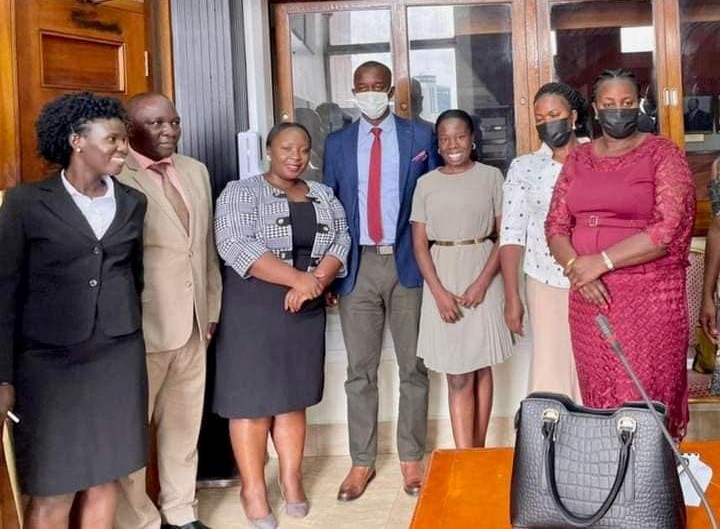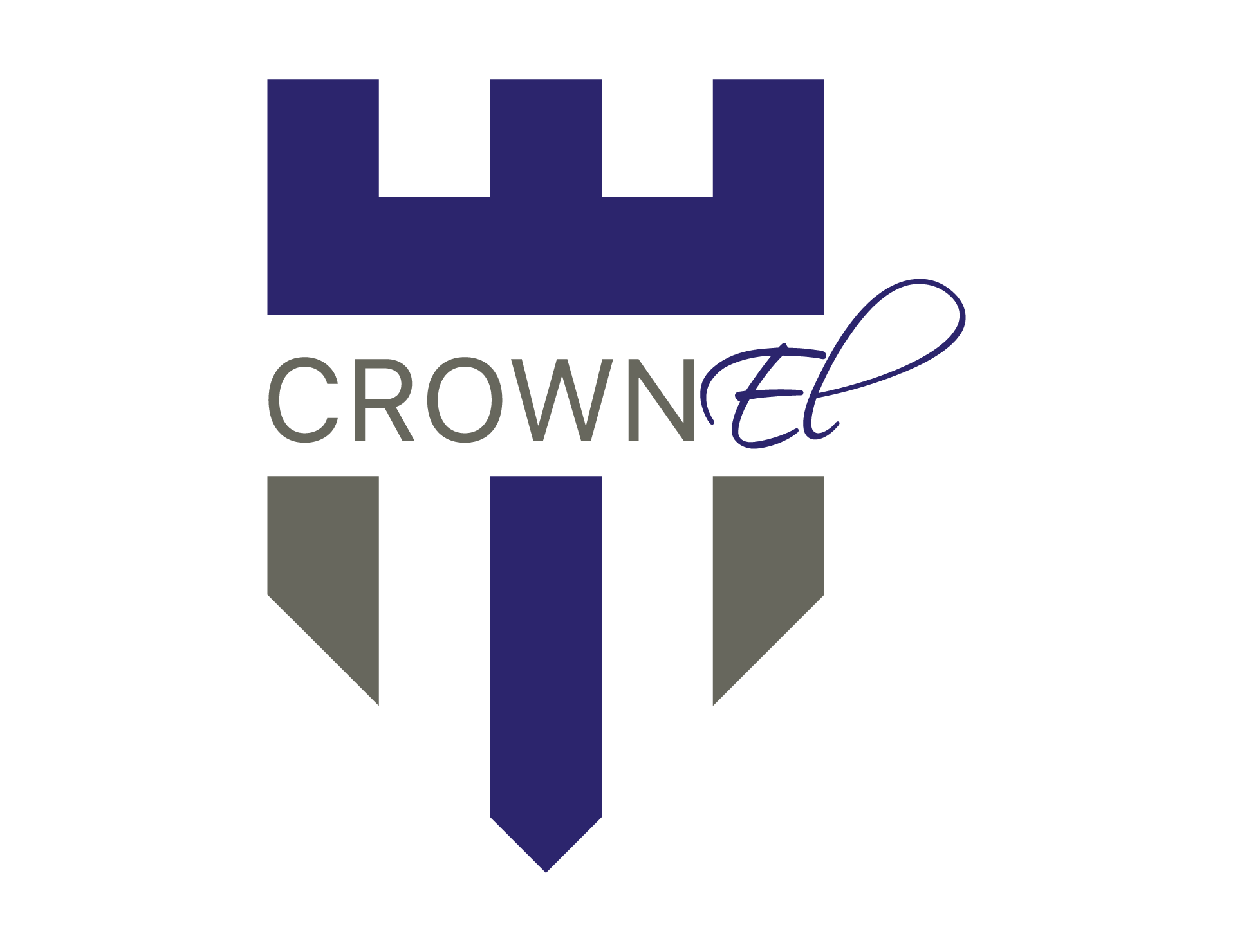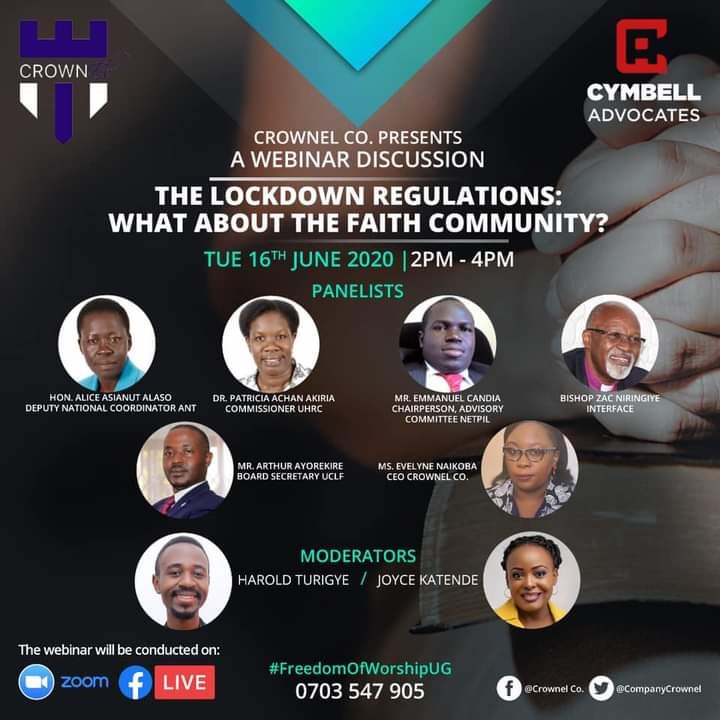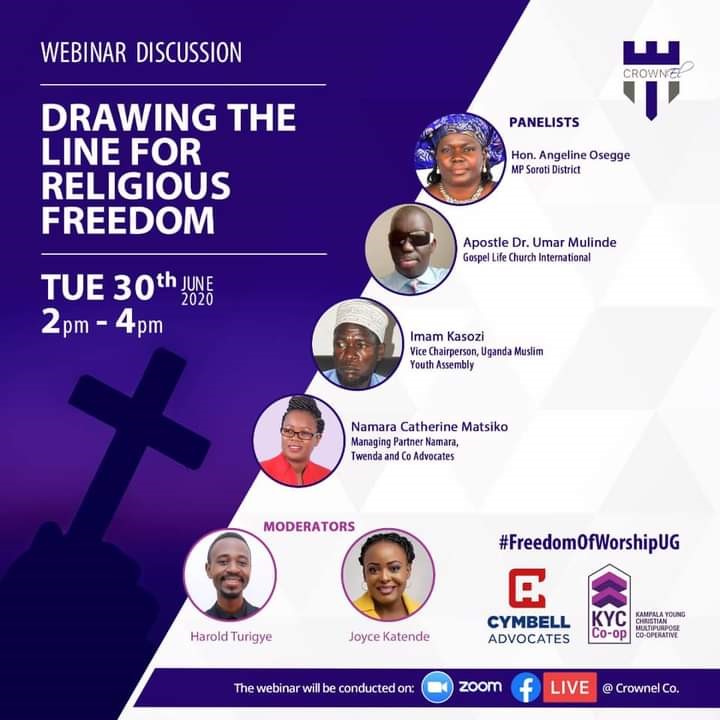Advocacy and Public Policy Engagement
Public Health Amendment Bill,2021
In December 2021, the Ugandan Government tabled a bill before parliament intended to amend the Public Health Act,1935. The Public Health Amendment Bill,2021 encapsulates various issues on management of infectious diseases and epidemics including imposition of a mandatory vaccination requirement for all its residents during epidemics, forced vaccination of children, hefty jail and express monetary penalties for non-compliance, and protection of officials from personal liability.
A team of legal professionals from Crownel Co. Ltd. appeared before the Parliamentary Health Committee to make submissions and advise it on emerging issues pertaining to the proposed Public Health (Amendment) Bill,2021. Crownel Co. presented to the Committee on matters of Human Rights, proportionality of the proposed measures and also advised the Committee on possible revisions. Discussions surrounded the need for informed consent in administering any treatment including vaccination, the need to establish responsibility and liability on the government and negligent health officials, and the position of individual rights vis-a-vis the government’s duty to protect its citizens in times of public health emergencies (public interest).

Public Health (Control of COVID-19) Rules 2021
Counsel Evelyne Naikoba of Crownel Co. along with Prophet Michael Kiganda, Dr. Zedriga Lina Waru Abuku, Hon. Alice Alaso, Hon. Ronald Balimwezo Nsubuga and Imam Semakula Asuman Lule filed a suit in the Constitutional Court challenged the constitutionality of guidelines issued leading to the closure of various public spaces including places of worship. They challenged Rule 11(1)(b) and Rule 13 of the Public Health (Control of Covid-19) Rules 2021 S.I No 38 of 2021 for being discriminatory, unconstitutional and in violation of the Constitution of the Republic of Uganda Articles 21,29,45 and 286.
Although the matter is yet to be set down for hearing, the said rules were repealed and unfair Covid restrictions lifted in January 2022.
A team of legal professionals from Crownel Co. Ltd. appeared before the Parliamentary Health Committee to make submissions and advise it on emerging issues pertaining to the proposed Public Health (Amendment) Bill,2021. Crownel Co. presented to the Committee on matters of Human Rights, proportionality of the proposed measures and also advised the Committee on possible revisions. Discussions surrounded the need for informed consent in administering any treatment including vaccination, the need to establish responsibility and liability on the government and negligent health officials, and the position of individual rights vis-a-vis the government’s duty to protect its citizens in times of public health emergencies (public interest).
The Religious and Faith-Based Organisations (RFBO) policy
Crownel Co. undertook an initiative against the proposed Religious and Faith-Based Organisations (RFBO) policy which was developed by the Directorate of Ethics and Integrity to stipulate the operations of faith based organisations or entities in various ways. This policy eventually led to the tabling of a private member’s Bill presented before Parliament by Hon. John Baptist Nambeshe on 30th January 2019. The Bill was however met with a lot of resistance; following which recommendations for further consultations were made by the Speaker of Parliament before the Bill could be tabled before Parliament again. On the 18th of July 2019, the Minister of Ethics and Integrity, Father Simon Lokodo, informed the public that the revised Bill was ready, and that it would be used as a solution against “fake” or “self-styled” pastors. Crownel Co. being the lead champion of the rule of law and justice in this country is undertaking an ongoing vigorous and sustained campaign against this Bill and any related activities.
Our position is that the policy and Bill are inconsistent with Articles 7 and 29 (1)(c) of the Constitution of the Republic of Uganda on non-adoption of a State religion and freedom of thought, conscience and religion respectively; not to mention Uganda’s obligations under various international instruments. Our strategic actions for this initiative therefore included an aggressive media campaign against this policy and Bill through radio and TV talk shows, regular publication of articles, public dialogues, countrywide sensitization drives, and engagement of Members of Parliament.
National and Regional Actors
Crownel Co. made initial contact with the Attorney General, the former Speaker of Parliament of Uganda -Hon. Rebecca Alitwala Kadaga, the Human Rights Committee of Parliament ,the Legal and Parliamentary committee of Parliament, the Uganda Human Rights Commission, the Uganda Law Society, African Commission on Human and Peoples Rights, UN Human Rights Council, UN Special Rapporteur on Freedom of Religion, and Amnesty International seeking a call to action against this unconstitutional policy/bill.
The White House Faith and Opportunities Initiative
Furthermore,in a bid to butress our initiative on this policy and Bill, Crownel Co. reached out to the Advisor of the White House Faith and Opportunities Initiative in Washington D.C. proposing a joint intervention to prohibit curtailment of religious freedom in Uganda. The White House Faith and Opportunities Initiative has been entrusted with a pivotal role in support of faith-based and community organisations in the United States of America to among other things advance religious liberties.
The Crownel Co. Team following the Meeting at the US Embassy.

Further to our correspondence to the White House Faith and Opportunities Initiative in July 2019 wherein Crownel Co. Ltd sought its intervention against potential curtailment of religious freedoms by the Government of Uganda through the proposed contentious Religious and Faith Organisations (RFO) Policy, Crownel held interaction with the United States Mission in Kampala in December 2019 on the general U.S. internal and external policy on Religious Freedoms. The Crownel Co. Ltd Team met with the Political and Economic Affairs Unit of the Embassy of the United States of America in Kampala comprising Ms. Mary Ellen Tsekos-Velez (Political Officer), Mr. John K. Abimanyi (Political and Economic Assistant) and Ms. Eva N. Namusoke (Political Assistant). The US Embassy team has since sought the contribution of Crownel Co. regarding the status of Religious freedoms in Uganda for inclusion in the annual Human Rights Status Report on Uganda to the US Government.
Electoral Reform Laws
In July 2019, the Government of Uganda through the former Attorney General, William Byaruhanga, tabled five proposed electoral reforms to several laws including; the Presidential Elections (Amendment) Bill No.17, 2019, the Parliamentary Elections (Amendment) Bill No.18, 2019, the Electoral Commission (Amendment) Bill No. 19, 2019, the Political Parties and Organization (Amendment) Bill No. 20, 2019 and the Local Governments (Amendment) Bill No.21, 2019.
These bills among other things sought to bar political parties from having links with pressure groups, restrain candidates from running as independents unless they ceased to be a member of a political party or organization twelve months before nomination yet a person elected to the Parliament as an independent candidate is afforded a right to enter into alliance with any political party of their choice upon joining Parliament, require candidates to declare to the Electoral Commission within Fourteen Days after nomination day, the source of funds for financing their election, and to permit presiding officers at each polling station to commence opening the ballot boxes in the presence of at least five voters as opposed to the previous arrangement provided for in law where the results are/were to be declared before interested parties and where cameras, mobile phones and any related recording devices not prohibited from a polling area.
Crownel prepared a position paper addressed to the Legal and Parliamentary Affairs Committee raising questions as to the legality and constitutionality of such proposals which were evidently anti democracy and underpinned by malafide intentions.
The Anti-GMO Campaign
An anti GMO campaign following the passing of the approval of the Genetic Engineering Regulatory Bill by the Parliament of the Republic of Uganda in November 2018. This Bill is intended to stipulate the safe development and application of biotechnology in Uganda. The Government has been considering this technology apparently to improve agricultural productivity and competitiveness and to address challenges arising from climate change and recent devastating pests and diseases; to meet the increasing demand for food, feed and income. The Bill previously known as the National Biotechnology and Biosafety Bill, 2012 was renamed following recommendation by the President who declined to assent to it; raising a number of concerns and the need to establish certain precautionary measures across the country to preserve the biodiversity. A clear reading of this bill indicates that despite its proposals for safe management of GMOs, it does not sufficiently address the potential human and environmental health risks involved as well as the economic ramifications on local communities.

Coffee Bill,2018
The controversial National Coffee Bill of 2018- now National Coffee Act,2021- was tabled before Parliament seeking to repeal the UCDA Act, Cap 325. The objective of the Bill was to empower the UCDA to regulate, promote and oversee the coffee sub sector and to regulate all on-farm and off-farm operations in the coffee value chain.
Crownel engaged with key regulators and stakeholders within the coffee industry to discuss the contested provisions within the Bill including: absolute powers accorded to the coffee regulatory authority in the mandatory registration of all coffee farmers, institution of the UCDA as lead implementer of coffee specific extension services-a role which has been handled by the MAAIF since 2014, unnecessary restrictions imposed on internal end-consumers of coffee that impact negatively on the internal coffee market, coffee price crisis, and the harsh punitive sanctions suggested in this Bill with respect to non-complaint farmers.
Crownel’s proposals included revision of the limitations imposed under clause 34 of the Coffee Bill requiring even local brewers and coffee shop owners to obtain licenses, imposition of heavier customs on coffee imports into the country which will also promote consumption of domestically produced coffee and in turn increase the demand for the coffee, use of the futures price system to determine coffee prices, exploration of purchase guarantees and provision of more income diversification schemes to coffee farmers by the government.
We also recommended that farmer registration be left to the farmers’ associations or cooperatives, that the regulatory authority works closely with representative bodies of the various actors in the coffee value chain rather than directly managing these processes.



